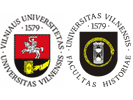The behaviour of the Lithuanians during the German occupation was a kind of response towards the fear and frustration prevailing during the Soviet period.
Nazi occupation, unlike the societ occupation (both preceding and subsequent) was nontotalitarian. Having fragmented the society, the Nazis made no attempt to annihilate it. Due to this reason the conditions during the war period were favourable enough to national and cultural activities of the Lithuanians. It was this so-called „softer” Nazi occupation that mostly predetermined the formation of namely unarmed cultural resistence in Lithuania.
Due to the same reason cultural resistence enjoyed most favourable conditions of activity, such as institutional channels of activity and a uniform national discourse, which was strong enough to mobilize the Lithuanians from all layers of society.
Due to historically predetermined circumstances, the intelligentsia assumed responsibility for the destiny of its nation and its culture. It never renounced this responsibility, regardless of the place of residence – be it in Lithuania or in emigration.
For the leading role in resistance movement members of the intelligentsia were most respected by their nation; certain representtives of this class served as models of moral values.
Based on the attitude towards practical activity and on the approach towards what is conformance and where its limits are, two camps of pragmatics and idealists were established.
Cultural resistence was built on idealism and therefore exerted significant influence on the education and formation of the younger generation of htat period. It gave rise not merly to partisans (guerillas) but also to the future dissidents and members of the cultural resistence movement of the soviet period.
The experience of the antinazi resistence during the Nazi occupation shaped the values and the type of behaviour of the Lithuanians (particularly among the intelligentsia), which were retained during the whole soviet period. One can even talk about a continuity or transfer of cultural resistence from the German to the Soviet period. | 

 dizainas ir programavimas giriaus
dizainas ir programavimas giriaus  dizainas ir programavimas giriaus
dizainas ir programavimas giriaus